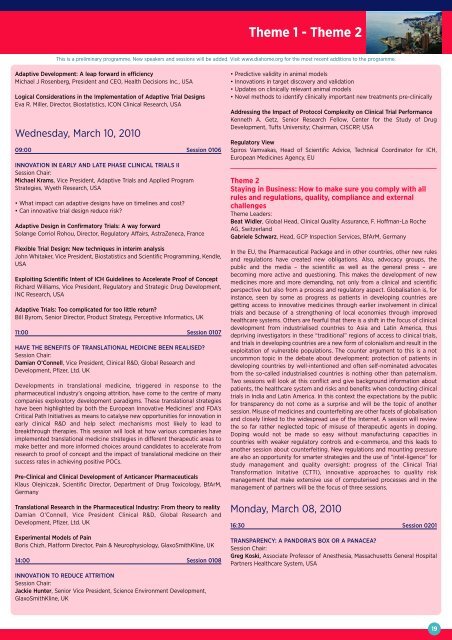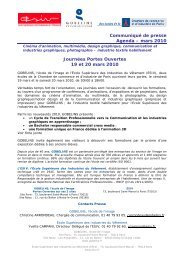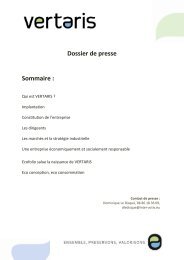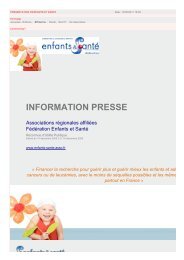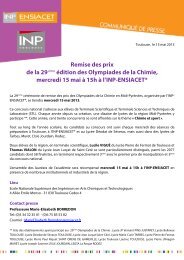Pre-Conference Tutorials, Monday, March 8, 2010, 09:00
Pre-Conference Tutorials, Monday, March 8, 2010, 09:00
Pre-Conference Tutorials, Monday, March 8, 2010, 09:00
You also want an ePaper? Increase the reach of your titles
YUMPU automatically turns print PDFs into web optimized ePapers that Google loves.
This is a preliminary programme. New speakers and sessions will be added. Visit www.diahome.org for the most recent additions to the programme.<br />
Adaptive Development: A leap forward in efficiency<br />
Michael J Rosenberg, <strong>Pre</strong>sident and CEO, Health Decisions Inc., USA<br />
Logical Considerations in the Implementation of Adaptive Trial Designs<br />
Eva R. Miller, Director, Biostatistics, ICON Clinical Research, USA<br />
Wednesday, <strong>March</strong> 10, <strong>2010</strong><br />
<strong>09</strong>:<strong>00</strong> Session 0106<br />
INNOVATION IN EARLY AND LATE PHASE CLINICAL TRIALS II<br />
Session Chair:<br />
Michael Krams, Vice <strong>Pre</strong>sident, Adaptive Trials and Applied Program<br />
Strategies, Wyeth Research, USA<br />
• What impact can adaptive designs have on timelines and cost?<br />
• Can innovative trial design reduce risk?<br />
Adaptive Design in Confirmatory Trials: A way forward<br />
Solange Corriol Rohou, Director, Regulatory Affairs, AstraZeneca, France<br />
Flexible Trial Design: New techniques in interim analysis<br />
John Whitaker, Vice <strong>Pre</strong>sident, Biostatistics and Scientific Programming, Kendle,<br />
USA<br />
Exploiting Scientific Intent of ICH Guidelines to Accelerate Proof of Concept<br />
Richard Williams, Vice <strong>Pre</strong>sident, Regulatory and Strategic Drug Development,<br />
INC Research, USA<br />
Adaptive Trials: Too complicated for too little return?<br />
Bill Byrom, Senior Director, Product Strategy, Perceptive Informatics, UK<br />
11:<strong>00</strong> Session 0107<br />
HAVE THE BENEFITS OF TRANSLATIONAL MEDICINE BEEN REALISED?<br />
Session Chair:<br />
Damian O’Connell, Vice <strong>Pre</strong>sident, Clinical R&D, Global Research and<br />
Development, Pfizer, Ltd. UK<br />
Developments in translational medicine, triggered in response to the<br />
pharmaceutical industry's ongoing attrition, have come to the centre of many<br />
companies exploratory development paradigms. These translational strategies<br />
have been highlighted by both the European Innovative Medicines' and FDA’s<br />
Critical Path Initiatives as means to catalyse new opportunities for innovation in<br />
early clinical R&D and help select mechanisms most likely to lead to<br />
breakthrough therapies. This session will look at how various companies have<br />
implemented translational medicine strategies in different therapeutic areas to<br />
make better and more informed choices around candidates to accelerate from<br />
research to proof of concept and the impact of translational medicine on their<br />
success rates in achieving positive POCs.<br />
<strong>Pre</strong>-Clinical and Clinical Development of Anticancer Pharmaceuticals<br />
Klaus Olejniczak, Scientific Director, Department of Drug Toxicology, BfArM,<br />
Germany<br />
Translational Research in the Pharmaceutical Industry: From theory to reality<br />
Damian O’Connell, Vice <strong>Pre</strong>sident Clinical R&D, Global Research and<br />
Development, Pfizer, Ltd. UK<br />
Experimental Models of Pain<br />
Boris Chizh, Platform Director, Pain & Neurophysiology, GlaxoSmithKline, UK<br />
14:<strong>00</strong> Session 0108<br />
INNOVATION TO REDUCE ATTRITION<br />
Session Chair:<br />
Jackie Hunter, Senior Vice <strong>Pre</strong>sident, Science Environment Development,<br />
GlaxoSmithKline, UK<br />
Theme 1 - Theme 2<br />
• <strong>Pre</strong>dictive validity in animal models<br />
• Innovations in target discovery and validation<br />
• Updates on clinically relevant animal models<br />
• Novel methods to identify clinically important new treatments pre-clinically<br />
Addressing the Impact of Protocol Complexity on Clinical Trial Performance<br />
Kenneth A. Getz, Senior Research Fellow, Center for the Study of Drug<br />
Development, Tufts University; Chairman, CISCRP, USA<br />
Regulatory View<br />
Spiros Vamvakas, Head of Scientific Advice, Technical Coordinator for ICH,<br />
European Medicines Agency, EU<br />
Theme 2<br />
Staying in Business: How to make sure you comply with all<br />
rules and regulations, quality, compliance and external<br />
challenges<br />
Theme Leaders:<br />
Beat Widler, Global Head, Clinical Quality Assurance, F. Hoffman-La Roche<br />
AG, Switzerland<br />
Gabriele Schwarz, Head, GCP Inspection Services, BfArM, Germany<br />
In the EU, the Pharmaceutical Package and in other countries, other new rules<br />
and regulations have created new obligations. Also, advocacy groups, the<br />
public and the media – the scientific as well as the general press – are<br />
becoming more active and questioning. This makes the development of new<br />
medicines more and more demanding, not only from a clinical and scientific<br />
perspective but also from a process and regulatory aspect. Globalisation is, for<br />
instance, seen by some as progress as patients in developing countries are<br />
getting access to innovative medicines through earlier involvement in clinical<br />
trials and because of a strengthening of local economies through improved<br />
healthcare systems. Others are fearful that there is a shift in the focus of clinical<br />
development from industrialised countries to Asia and Latin America, thus<br />
depriving investigators in these “traditional” regions of access to clinical trials,<br />
and trials in developing countries are a new form of colonialism and result in the<br />
exploitation of vulnerable populations. The counter argument to this is a not<br />
uncommon topic in the debate about development: protection of patients in<br />
developing countries by well-intentioned and often self-nominated advocates<br />
from the so-called industrialised countries is nothing other than paternalism.<br />
Two sessions will look at this conflict and give background information about<br />
patients, the healthcare system and risks and benefits when conducting clinical<br />
trials in India and Latin America. In this context the expectations by the public<br />
for transparency do not come as a surprise and will be the topic of another<br />
session. Misuse of medicines and counterfeiting are other facets of globalisation<br />
and closely linked to the widespread use of the Internet. A session will review<br />
the so far rather neglected topic of misuse of therapeutic agents in doping.<br />
Doping would not be made so easy without manufacturing capacities in<br />
countries with weaker regulatory controls and e-commerce, and this leads to<br />
another session about counterfeiting. New regulations and mounting pressure<br />
are also an opportunity for smarter strategies and the use of “intel-ligence” for<br />
study management and quality oversight: progress of the Clinical Trial<br />
Transformation Initative (CTTI), innovative approaches to quality risk<br />
management that make extensive use of computerised processes and in the<br />
management of partners will be the focus of three sessions.<br />
<strong>Monday</strong>, <strong>March</strong> 08, <strong>2010</strong><br />
16:30 Session 0201<br />
TRANSPARENCY: A PANDORA’S BOX OR A PANACEA?<br />
Session Chair:<br />
Greg Koski, Associate Professor of Anesthesia, Massachusetts General Hospital<br />
Partners Healthcare System, USA<br />
19


